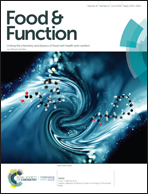Eucalyptus globulus Labill. decoction extract inhibits the growth of NCI-H460 cells by increasing the p53 levels and altering the cell cycle profile
Abstract
Eucalyptus globulus Labill. is a widespread evergreen plant belonging to the Myrtaceae family. Several species of Eucalyptus are known to have a plethora of medicinal properties, particularly anti-tumor activity, which prompts the study of the chemical composition and bioactivity of extracts from this plant. Hereby, the main aims of this work were to (i) profile the phenolic compounds in E. globulus extracts prepared by decoction and infusion; (ii) test the cell growth inhibitory activity of E. globulus decoction and infusion, in three human tumor cell line models: colorectal, pancreatic and non-small cell lung cancer (HCT-15, PANC-1 and NCI-H460, respectively); and (iii) study the mechanism of action of the most potent extract in the most sensitive cell line. Our work demonstrated that both the decoction and infusion preparations revealed the presence of phenolic acids, flavonoids and gallotannins, the last group being the most abundant polyphenols found, especially two digalloyl-glucosides. Both extracts inhibited the growth of all the tumor cell lines tested. The decoction extract was the most potent in inhibiting the NCI-H460 cell growth (lower GI50 determined by sulforhodamine B assay), which could be due to its higher content of phenolic compounds. Hence, the effect of the decoction extract on the NCI-H460 cells was further investigated. For this, cell viability (by Trypan blue exclusion assay), the cell cycle profile and apoptosis (by flow cytometry), cell proliferation (by bromodeoxyuridine assay) and protein expression (by western blot) were analyzed. Two different concentrations of the extract (52 μg mL−1 and 104 μg mL−1, corresponding to GI50 and 2 × GI50 concentration) were tested in these studies. Remarkably, the E. globulus decoction extract caused a dose-dependent decrease in the NCI-H460 cell number, which was correlated with a cell cycle arrest in the G0/G1 phase, a decrease in cell proliferation and an increase in the expression of p53, p21 and cyclin D1 proteins. Interestingly, no differences were found in the levels of ds-DNA damage and in the levels of apoptosis. This work highlights the relevance of the Eucalyptus globulus Labill. extract as a source of bioactive compounds with potential anti-tumor activity.



 Please wait while we load your content...
Please wait while we load your content...